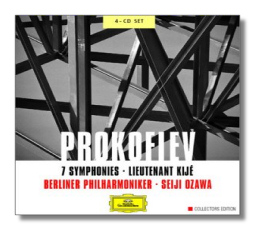
The Internet's Premier Classical Music Source
Related Links
- Prokofieff Reviews
- Latest Reviews
- More Reviews
-
By Composer
-
Collections
DVD & Blu-ray
Books
Concert Reviews
Articles/Interviews
Software
Audio
Search Amazon
Recommended Links
Site News
 CD Review
CD Review
Serge Prokofieff

Symphonies
- Symphony #1 in D Major "Classical", Op. 25 (1917)
- Symphony #2 in D minor, Op. 40 (1925)
- Symphony #3 in C minor, Op. 44 (1928)
- Symphony #4 in C Major, Op. 112 (Second Version)
- Symphony #5, Op. 100 (1945)
- Symphony #6 in E Flat minor, Op. 111 (1947)
- Symphony #7 in C Sharp minor, Op. 131 (1953)
- Lieutenant Kijé Suite, Op. 60 (1934) *
* Andreas Schmidt, baritone
Berlin Philharmonic Orchestra/Seiji Ozawa
Deutsche Grammophon 463761-2 4CDs
This is a reissue of performances recorded between April, 1989, and November, 1992, in the Berlin Philharmonie (#1 and 7 only) and Jesus-Christus-Kirche, Berlin. Not surprisingly, DG's sound is vivid and detailed, if a bit unbalanced in a few passages. This set has received mixed reviews and must be considered in the company of fairly formidable competition in the complete Prokofieff Symphonies – Järvi/Chandos, Kuchar/Naxos, Martinon/Vox, and Kosler/Supraphon. The Rozhdestvensky/Melodiya, Rostropovich/Erato and Weller/Decca sets are currently unavailable.
Only Järvi and Rostropovich recorded both versions of the Fourth Symphony, a work whose later, expanded rendition is usually the choice by conductors for recordings and concert performances. Critics, however, have tended to favor the early version, but it is the Op. 112 Fourth that is clearly superior, both for its epic character and greater sense of symphonic development.
But onto the issue at hand. Ozawa's Classical Symphony is one of the slowest ever recorded. Still, it is a good one, the bright colors and wit coming through in splendid playing by the Berliners. The masterful but still-underrated Second Symphony, one of Prokofieff's more challenging works for listeners, is perhaps Ozawa's best reading in this set. The "iron and steel" (Prokofieff's description) of the savage first movement is conveyed with muscle and clarity, while the ensuing theme-and-variations second movement is rendered with an insightful view to its kaleidoscopic nature and raw power.
The Third Symphony, based on materials from Prokofieff's masterful opera, The Fiery Angel, gets a decent enough performance, but it lacks bite, especially in the grim and acid-drenched finale. You hear everything, all right, and in excellent playing, but the sense of otherworldliness and dread is largely absent, a somewhat antiseptic interpretive approach replacing it instead. The Fourth suffers from similar weaknesses, though the first two movements are quite compelling, and throughout the whole Symphony Ozawa wisely eschews inserting the rubato that Järvi and Kuchar use at climactic moments in the first and fourth movements. What may be most disconcerting about Ozawa's Fourth, however, is the overly slow tempo he chooses for the third movement. No one has ever surpassed Ormandy in this Symphony and Sony ought to reissue his reading.
Ozawa's Fifth is quite good, a bit on the brisk side, but generally well-conceived. It must, however, compete against many fine versions, including Bernstein/Sony (with the NY Phil and the Israeli Phil), Levi/Telarc, Levine/DG, and Ormandy/Sony Classics. In the end, this somewhat tame Fifth cannot be considered in the company of the better renditions. Ozawa's Sixth, however, can be. At times, it, too, can be tame, but the conductor's judicious tempos, imaginative shaping of orchestral choirs, and attention to meaningfdetail elevate this Sixth to first-tier level. The development section of the first movement comes through with great clarity, its climax punctuated by thudding drums that for once summon wartime images, as the composer intended. The Seventh is less successful, though quite decent. Here balances tend to be off kilter in a few places: listen, for example, to the brawny horn intrude on the lovely alternate theme in the first movement.
The Lieutenant Kijé Suite will have some special interest for Prokofieff mavens, since it is one of the rare recordings featuring the baritone soloist in #2 (Romance) and 4 (Troika). In that role, Andreas Schmidt, who exhibits a rather bright and spirited voice here, turns in splendid work. Overall, Ozawa captures the light and lightly tragic character of this delightful score.
The Berliners play splendidly throughout, and despite what some critics have opined, are quite at home in the music of Prokofieff. Recommendations? To someone who wants a complete set of Prokofieff Symphonies, Järvi/Chandos is still probably the one to get. Kuchar will do for those on a budget; Martinon is not recommendable because of inferior sound and often rushed performances; and Zdeněk Kosler was too much of a hit-and-miss fellow in these works. Ozawa is a safe choice for good sound (probably the best in any of these sets), generally decent performances (even if they sometimes tend to be tame), and because DG's price for the 4-disc set is actually lower than that of the five discs comprising the Kuchar/Naxos.
Copyright © 2001, Robert Cummings


















